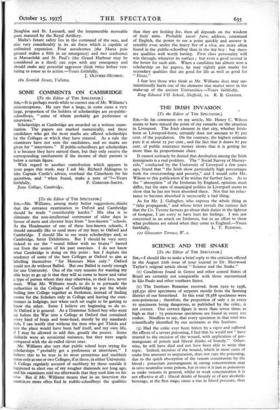[To the Editor of THE SPECTATOR.] SIR,—Mr. Williams, among many
better suggestions, thinks that the entrance examination to Oxford and Cambridge should be made "considerably harder." His idea is to eliminate the non-intellectual commoner of older days in favour of more and cleverer boys from " less-known " schools. As the Headmaster of one of these less-known schools, I should naturally like to send more of my boys to Oxford and Cambridge. I should like to see more scholarships and, at Cambridge, fatter. Exhibitions. But I should be very sorry indeed to see the "sound fellow with no brains" barred out from the scenes of his past exercises. I do not know what Cambridge is doing on this point : but I deplore the tendency of some of the best Colleges at Oxford to aim at labelling themselves "for Honours Men only." Oxford could not do without Balliol. But one Balliol is surely enough for one University. One of the very reasons for wanting my able boys to go up is that they will so come to know and value a type of person whom they may otherwise, to their loss, never meet. What Mr. Williams needs to do is to persuade the authorities in the Colleges of Cambridge to put the whole boiling into College together as freshmen, instead of finding rooms for the Scholars only in College and leaving the com- moners in lodgings, just when each set ought to be getting to know the other. Some I believe are beginning to do so. At Oxford it is general. As a Grammar School boy who went up before the War into a College at Oxford that contained every kind of brain and bone-head, mostly by my standards rich, I can testify that without the men who got Thirds and less the place would have been half itself, and my own life, if I may be allowed to add this, greatly the poorer. Some dullards were an occasional nuisance, but they were angels compared with the de-railed clever ones.
Mr. Williams also says that public school boys trying for scholarships "probably get a preference at interviews." I believe this to be true in its most pernicious and snobbish sense only at one or two Colleges, if at those, in either University. A College regularly accused of snobbery by those outside it happened to elect one of my rougher diamonds not long ago, and his examiners told me afterwards that they took him on his viva. But if Mr. Williams means that in an interview the examinzrs more often find in public-schoolboys the qualities that they are looking for, then all depends on the wisdom of their aims. Probably savoir faire, address, command of English, the power to see a point quickly and answer it sensibly even under the heavy fire of a viva, are more often found in the public-schoolboy than in the day boy : but these are qualities well worth having. First class personality will win through, whatever its surface ; but even a good second is the better for such aids. When a candidate has almost won a scholarship on his papers, he may rightly gain marks for secondary qualities that are good for life as well as good for " Firsts."
I fear lest those who think as Mr. Williams does may un- intentionally harm one of the elements that matter most in the make-up of the ancient Universities.—Yours faithfully,
King Edward VII School, Sheffield, .to. R. B. GRAHAM.






















































 Previous page
Previous page